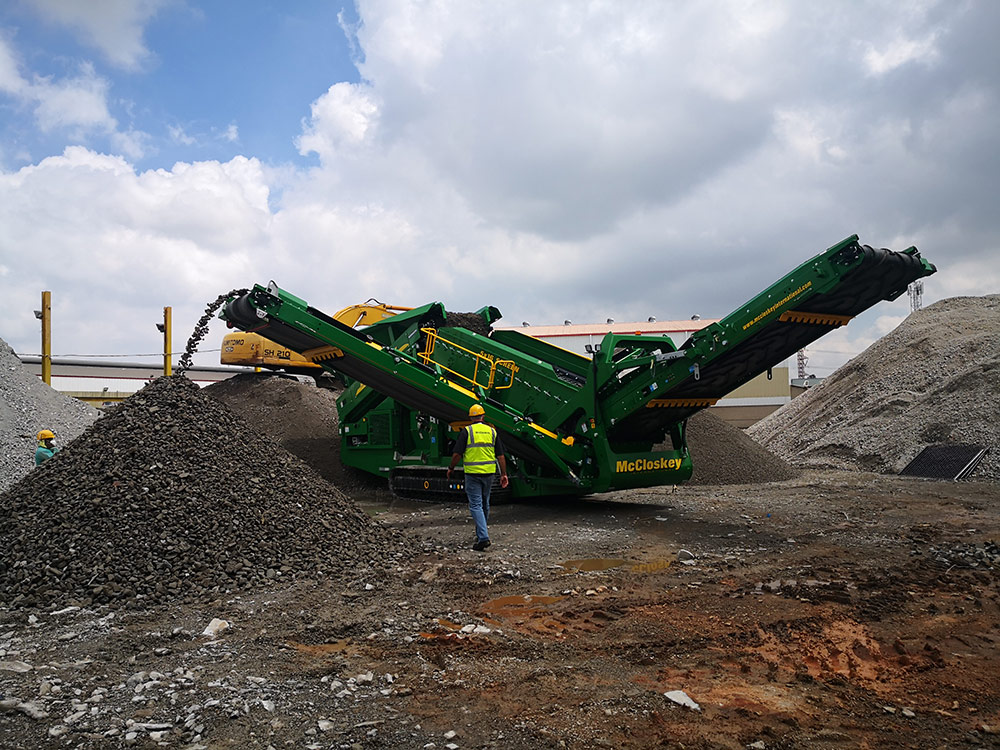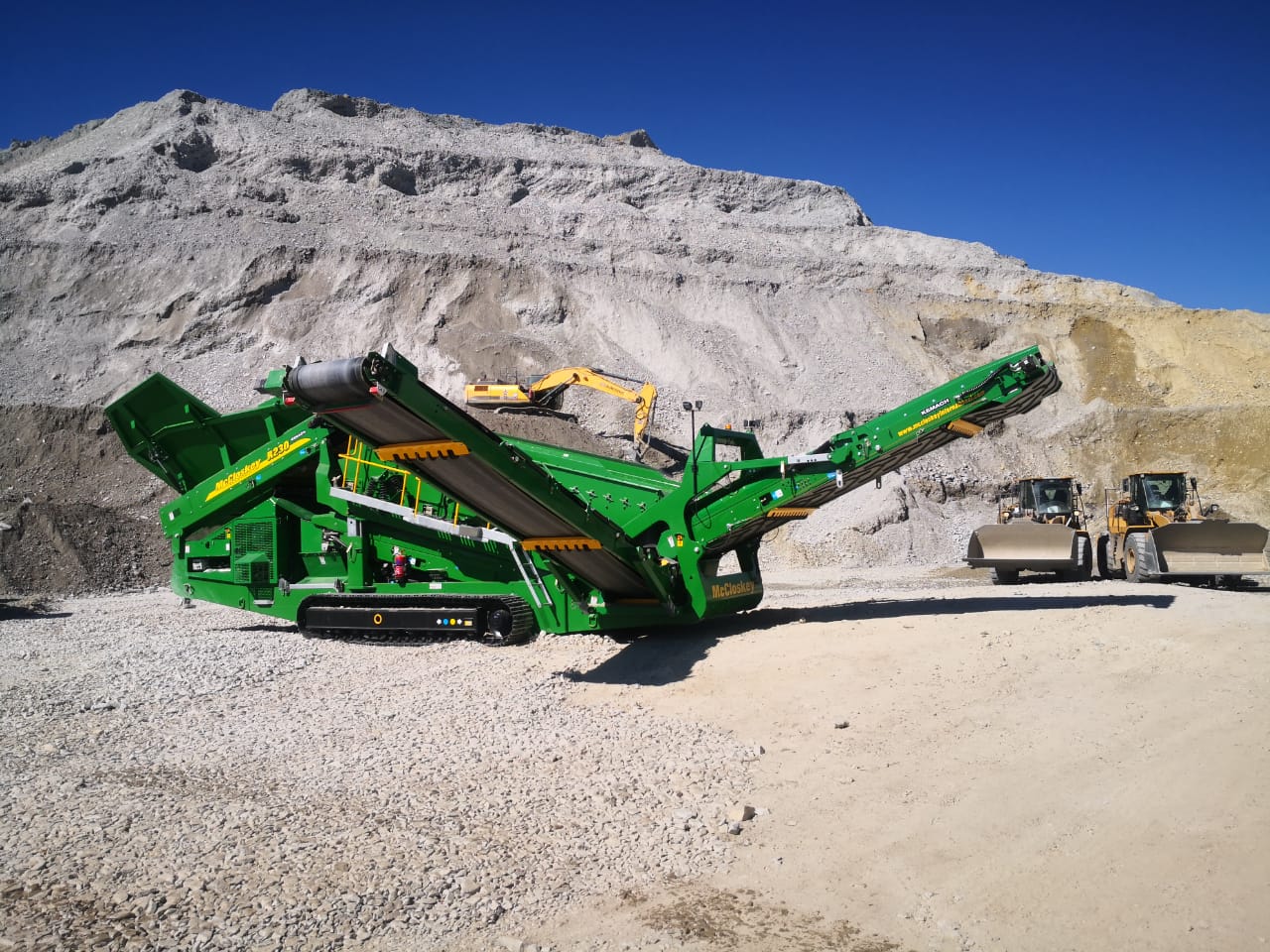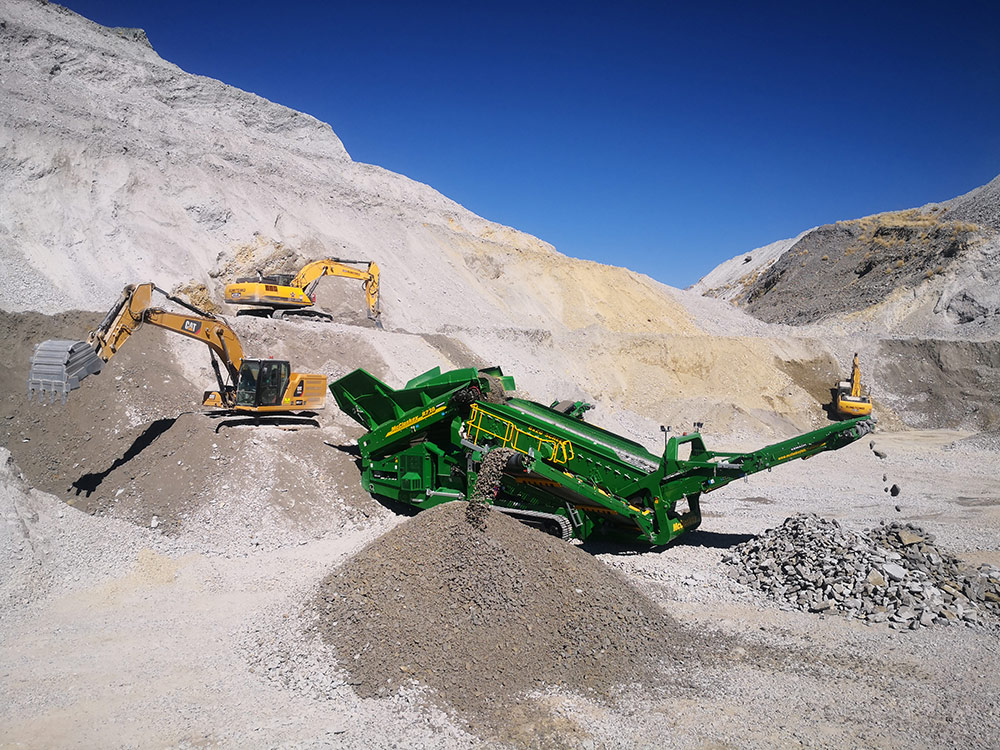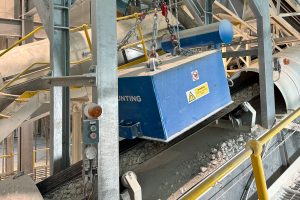When Crush-It Green (CIG) went into the market for a scalper early last year, its preferred supplier had just sold the last two scalping screens it had in stock at the time. Waiting for new stock was not an option as current supply chain disruptions meant that there was going to be a long lead time. Instead, partner Clint Rodwell tells Quarrying Africa, CIG ‘took a chance’ on a Kemach Equipment-supplied McCloskey R155 scalper, which to date has lived up to its billing, writes Munesu Shoko.
Founded in 2019 when the two partners took over an existing recycling and production facility that had been in operation since 2016, Crush-It Green has grown significantly in a short space of time. With environmental stewardship becoming an increasingly popular topic globally, recycling construction materials has become more important than ever, as the industry seeks to reduce its carbon footprint.
With its origins firmly rooted in recycling, CIG is one of the few South African companies that holds a Global GreenTag Certification, one of the world’s most trusted and widely recognised ecolabels. Although it is still involved in some notable concrete and rubble recycling projects, the company has in recent years ventured into crushing and screening of virgin material, given the slow nature of the recycling business in South Africa, due to the lack of legislation and incentives for companies to recycle.
CIG is currently working on a few sites in Gauteng, including Nigel, Soweto and Germiston, where it is screening gold-bearing dumps for a client and then crush the rock to make aggregate for the construction and building industry. Here, the company produces a range of product sizes, but G5, builder’s mix and crusher sand are the market drivers.
With an expanding project portfolio, the company went into the market for a new scalper early last year to bolster its existing fleet of five machines – two cone crushers, a jaw, a scalper and a screen. Having traditionally been loyal to a certain premium brand for its crushing and screening equipment needs, CIG took delivery of its first ever McCloskey machine, the R155 scalper, in March 2021.
“We have always run a certain brand, but our usual supplier didn’t have stock at the time, and we wanted a scalper quite urgently. We were not keen on a second-hand unit and could not afford the long lead time due to the current supply chain disruptions brought about the COVID-19 pandemic,” says Rodwell.
At the time, Bradley Karolus, sales specialist at Kemach Equipment, whom Rodwell had dealt with before in his previous job capacity, had just joined Kemach to drive sales for McCloskey following the company’s appointment as the South African dealer in October 2020.
“Bradley approached and assured us that the McCloskey R155 scalper was equally good, production-wise, and this has turned out to be true. In fact, Kemach offered to trial the machine at our site for two weeks with no obligation for us to buy. At the end of the day, we did not take them up on the offer. With Bradley’s assurances and industry knowledge, we decided to take a chance and bought the McCloskey scalper. From the onset, we were impressed by the commitment from Kemach. We are happy with the decision we made. Previously we would not look at any other brand, but in future we will also consider McCloskey for our crushing and screening equipment needs,” says Rodwell.

Versatility to the fore
The reason behind CIG’s decision to buy a scalper was due to its versatility. “We went into the market for a scalper because it’s a multi-purpose machine; it can be used as a scalper and a final screen,” explains Rodwell.
According to Karolus, the McCloskey range is one of the most versatile offerings in this market. For example, the feeding arrangement of the machines can swing between an apron and a belt feeder, whereas most other OEM offerings offer either of the two.
“We have both options – apron and belt feeder – to suit different customer needs. We understand that customers require different feeder arrangements for different applications. We have taken a deliberate approach to offer unparalleled flexibility in many areas of our offering,” says Karolus.
The other feature that appealed to CIG was the fact that the top deck of the scalper is interchangeable. “The machine’s top deck is much more versatile; it can be configured with grizzly, mesh or punch plate. McCloskey is one of the very few manufacturers in the market that offer such a versatile scalper,” says Rodwell. CIG initially ordered its McCloskey R155 scalper in a grizzly configuration, but later opted for a punch plate, which was more suited to the application.
The ability to change the machine’s conveyors to either side of the machine is another key feature that speaks to the machine’s versatility. “This is an important feature,” says Rodwell. “Being able to configure the fines and mid-size conveyors in either direction means that one can change their discharge points with ease. This ensures that the wheel loader, which burns the most fuel on site, is not riding too far to feed the machine.”

Parts and support
Another crucial factor in CIG’s decision was the fact that McCloskey runs common components such as engines and hydraulics. “One of the important things for us was the fact that the machine runs a Cat engine, which is a common motor in the market. If for whatever reason the dealer is not able to help with idlers or pumps, for example, we can easily access those parts elsewhere,” says Rodwell.
Karolus also makes special mention of parts commonality among the company’s different models as a key competitive edge for the McCloskey offering. For example, the McCloskey I44R discharge pulley is interchangeable with the McCloskey R155 scalper’s feeder belt.
Every machine is as good as its service. A year after taking delivery of the machine, Rodwell says the service from Kemach has been good.
To better support the McCloskey brand, Kemach has put in place dedicated support structures. Parts availability, especially critical and fast-moving parts, have been key factors in ensuring uptime for customers.
Additionally, the company’s strong branch footprint across all key regions of South Africa has ensured quick growth for the McCloskey brand under Kemach’s distributorship. Sales, support and service are delivered through Kemach’s extensive southern African footprint, including its national office based in Gauteng, and branches situated in 11 locations throughout South Africa.
The McCloskey machine comes with a standard 2 years/3 000 hours warranty. An extended warranty option is available and can go up to 4 years/ 6 000 hours. Of importance to CIG, concludes Rodwell, was the fact that the McCloskey warranty is transferable to another owner on resale, something several other manufacturers do not offer.
This feature first appeared in the January/February edition of Quarrying Africa.





![Data from the World Risk Poll shows that one in five (21%) people in mining and quarrying occupations have experienced harm at work in the past two years. [Photo by Shane McLendon on Unsplash]](https://quarryingafrica.com/wp-content/uploads/2024/10/shane-mclendon-89hUOLtVfoI-unsplash-300x225.jpg)
